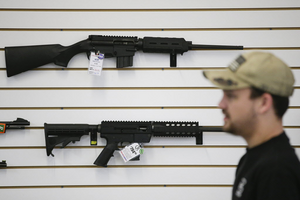California gun law will allow families to petition for gun-restraining orders
California will become the first state to allow citizens to petition a court to temporarily seize family members' guns if they fear a danger to themselves or others.

n this Dec. 9, 2015, photo, a sales associate walks past semiautomatic rifles at Bullseye Sport gun shop in Riverside, Calif. A new California law will allow concerned family members to petition for a gun-restraining order if they fear danger for themselves or others.
Jae C. Hong/AP
Starting on Friday, Jan. 1, Californians concerned that a family member could become violent will be able to petition courts to temporarily seize their guns.
Law AB-1014, signed by Governor Jerry Brown in September 2014 after Elliot Rodger fatally stabbed and shot six people in Isla Vista that May, is the first of its kind in the nation. While gun-control advocates and mental health specialists have supported the law as a key to preventing suicides and murders, gun rights' supporters have questioned whether it adequately protects gun owners, who do not need to be convicted to have the court approve the seizure.
Relatives concerned that a family member presents a danger to themselves or others will be allowed to petition the court for a gun-restraining order, permitting officials to seize their weapons and prevent them from buying new ones. After three weeks, the individual may challenge the restraining order.
California has some of the most restrictive gun laws in the United States: The Law Center to Prevent Gun Violence grades it #1 in gun laws, and #42 in gun deaths.
The state will enact two more firearms laws on January 1: pellet, BB, and airsoft guns must be brightly colored, to help distinguish them; and concealed carry permit holders will no longer be allowed to bring their weapons onto school grounds or college campuses.
Law AB-1014 is similar to existing laws in states such as Connecticut and New Jersey, which permit law enforcement to petition to seize guns if the owner is deemed a threat, particularly in domestic violence cases.
California is the first state to allow family members to make a petition. The state already permits licensed therapists to recommend a gun seizure if they believe a patient is dangerous. The state also prohibits people with violent criminal records, or a history of involuntary admittance to a mental health facility, from owning firearms.
"It's an opportunity for mental health professionals to provide an analysis of a person’s mental state," Los Angeles Police Department Assistant Chief Michael Moore told Southern California Public Radio, saying "It’s a short duration and it allows for due process."
But others are concerned that gun owners are not always given a chance to explain themselves in court before a judge approves the seizure, and worry that the petitions will be abused. Although some mental health experts applauded the law, many cautioned that predicting which individuals may become violent is an imperfect, if not impossible, science.
Other opponents have doubted the law's power to prevent attacks. "Every one of us wants to prevent a mass shooting," California assemblyman Tim Donnelly told The New York Times in 2014:
The question is: Would this bill stop that? I don’t believe you can ever stop that with laws. I don’t believe you can legislate evil out of the hearts of men.
According to polls, 44 percent of Americans believe it is likely that the government will try to seize all privately-owned guns "over the next generation." Many of them fear that legal seizures, especially for people who have not yet committed crimes, will give the government too much power.
Defenders point to the Isla Vista rampage, near Santa Barbara, as evidence that family members often spot problems first, and should be equipped to prevent tragedies. Before releasing a 140-page manifesto immediately before the attacks, a document detailing his sexual frustrations and fury at women who had rejected his advances, the 22 year-old Mr. Rodger had uploaded threatening videos online.
"Start envisioning a world where WOMEN FEAR YOU," he posted to PUAhate, a website for men critical of so-called pick up artists, which was taken down after the killings.
Rodger's parents, who say they had attempted to manage his mental disorders since childhood, found the videos and alerted law enforcement in April 2014. But police decided he did not present a threat, and that they did not have a basis to search his apartment, where he kept several guns and knives.

